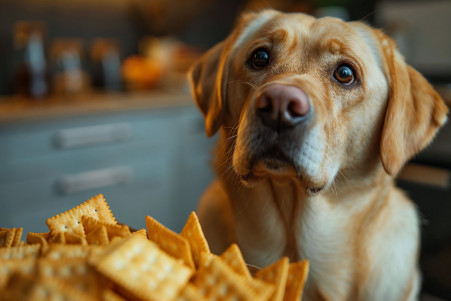Can Dogs Have Cheese Balls? A Vet's Guide to Human Food
29 March 2024 • Updated 29 March 2024

You might be tempted to share your cheese balls with your dog, but are they safe for your furry friend? While a little bit of cheese is fine for most dogs, cheese balls are high in fat, salt, and other ingredients that can lead to digestive problems, weight gain, and other health issues. As a result, it's best to steer clear of cheese balls and other salty, fatty human snacks when it comes to feeding your dog.
But while cheese balls are a questionable choice for your dog, the bigger question is: what human foods are actually safe for dogs to eat? To answer that question, we'll take a look at the latest studies from veterinary nutritionists, toxicologists, and other pet food experts, so you can learn about the nutrients that dogs need, the foods that can provide them in a safe way, and the ingredients that you should avoid due to their potential impact on your dog's well-being. Armed with this information, you can make the best choices for your dog's diet and set them up for a long, healthy life.
Can dogs eat cheese balls?
Potential Health Dangers of Giving Dogs Cheese Balls
While a small amount of plain cheese can be an acceptable treat for most dogs, cheese balls and other processed cheese snacks pose significant health risks due to their high fat, salt, and additive content. According to PetMD, cheese balls are filled with lactose, preservatives, fat, and lots of sodium which can cause issues for dogs.
Excessive fat consumption from cheese balls can result in obesity and pancreatitis in dogs. The American Kennel Club explains that cheese is high in fat, and feeding too much to your dog regularly can cause weight gain and lead to obesity. Even more problematic, it could lead to pancreatitis, a serious and potentially fatal illness in dogs.
The high levels of sodium in cheese balls can also lead to salt toxicity and dehydration in dogs. As explained by BeCoPets, dogs that have kidney problems should avoid cheese because of its naturally high salt content that can impact the kidneys' ability to function properly.
In addition, many cheese ball products contain ingredients that are toxic to dogs, including garlic, onions, and chives, which the AKC says are toxic to dogs. Even small amounts of these ingredients can be dangerous.
Puppies and dogs with sensitive stomachs are at a higher risk of experiencing digestive upset from cheese balls and other rich, processed cheese products. PetMD explains that puppies generally have more sensitive stomachs than adult dogs. So even small amounts of cheese can trigger vomiting and diarrhea in younger dogs. In general, while not toxic in small amounts, there are too many potential health dangers of giving dogs cheese balls for it to be considered a safe treat.
Dangerous Ingredients in Cheese Balls for Dogs
Cheese balls are loaded with sodium and salt, which can be very harmful to dogs. According to The Goody Pet, salt can cause salt poisoning and dehydration in dogs. The site also notes that the cornmeal, vegetable oils, and whey in cheese balls can cause digestive problems and pancreatitis if consumed in large amounts.
In addition, many cheese ball brands include seasonings, preservatives, and artificial flavors in their products, some of which can be toxic to dogs. Bella & Duke warns that dogs should avoid any cheese products that include added herbs or vegetables, such as onions, garlic, and chives, which are poisonous to dogs.
To make sure you're not feeding your dog anything dangerous, always check the ingredients and avoid any cheese balls or other processed cheese products that include additives that could be harmful. As Hill's Pet Nutrition notes, it's important to feed dogs cheese-based treats in moderation.
How Much Cheese Can Dogs Have?
If you decide to give your dog cheese, it's important to do so in moderation. According to BeChewy, veterinarians recommend that high-calorie treats like cheese should account for no more than 10% of a dog's daily caloric intake. The amount of cheese you can give your dog will also depend on their size, with larger dogs potentially being able to eat a little more cheese than smaller dogs.
Daily Paws says that dogs should have no more than a few small bites of cheese each day. Cottage cheese, mozzarella, and cheddar are all lower-fat cheeses that are generally safe for dogs to eat in moderation. However, it's still important to talk to your vet, especially if your dog has a condition like obesity or pancreatitis that could be made worse by eating cheese.
As Bully Sticks Central points out, dogs that are overweight, obese, or have kidney issues should not eat cheese. It's important to make sure you're feeding your dog cheese in moderation and watching portion sizes no matter what type of dairy treat you're giving them.
Lactose Intolerance and Other Dog Treats
Some dogs may be lactose intolerant, which means they don't have enough of the enzyme lactase to break down the lactose in cheese and other dairy products. According to Dog Food Advisor, lactose intolerance can lead to short-term digestive problems in dogs, including gas, bloating, vomiting, or diarrhea.
That said, not all dairy products are created equal when it comes to lactose intolerance. As Dogsee points out, aged or hard cheeses like cheddar and Swiss have significantly less lactose than milk or ice cream, which means they're less likely to cause problems for dogs that are sensitive to lactose.
For dogs that are sensitive to all dairy products, there are plenty of other healthy treats to choose from. Eileenanddogs recommends fresh fruits and vegetables, as well as homemade peanut butter and cream cheese treats that are free of lactose. The important thing is to work with a vet to determine any food sensitivities and come up with a plan for feeding your dog a healthy, balanced diet that includes treats.
Homemade Cheese Dog Treat Recipes
For pet parents who want to offer a healthier alternative to store-bought cheese puffs, homemade cheese dog treats are a great choice. As explained on the Zoetis Petcare blog, lower-fat cheeses like mozzarella and cottage cheese can be a healthy and nutritious part of a dog's diet if they're fed in moderation. The blog post explains that cheese contains calcium, protein, vitamins, and essential fatty acids that can help contribute to a dog's well-being.
Of course, when making homemade treats, it's important to avoid any ingredients that are toxic to dogs, including garlic, onions, and blue cheese. As mentioned on The Cookie Rookie, virtually any type of cheese (except blue!) can be used, with lower-fat cheeses being the best option. Meanwhile, recipes like Belly Full's Cheddar Dog Biscuits use natural, simple ingredients like rice flour, eggs, and honey to make healthy, delicious treats.
In addition, it's important to think about how to store and serve homemade dog treats. According to The Cookie Rookie, the biscuits can be stored in an airtight container for up to 2 months or in the freezer for 3-4 months. That said, it's also important to remember that even the healthiest homemade treats should be fed in moderation and not as a substitute for a well-balanced, nutritious dog diet.
Conclusion: How to Keep Your Dog Healthy and Happy
In conclusion, while cheese can be an occasional treat for most dogs, cheese balls and other processed cheese snacks are generally not recommended due to their high fat, salt, and additive content. It's important to be aware of the potential health risks, practice moderation, and consult with a veterinarian - especially for dogs with dietary restrictions or health conditions.
By making informed decisions about your dog's diet and providing safe, nutritious treat options, you can help keep your furry friend happy and healthy for years to come.


